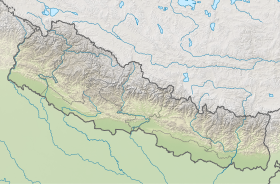Charkose Jhadi

| Charkose Jhadi | |
|---|---|
| Location | Tarahara and Dharan, Nepal |
| Nearest city | Tarahara Eastern Nepal |
| Coordinates | 26°43′42″N 87°22′45″E / 26.72833°N 87.37917°E |
| Length | 35km |
| Width | 12km |
| Area | 19,845 acres (80.31 km2) |
| Elevation | 210 ft (64 m) |
| Governing body | Ministry of Forests and Environment |
Charkose Jhadi (or in Nepali, चार कोशे झाडी) is the largest and the most dense forest in Nepal.[1] It lies between Tarahara and Dharan in Eastern Nepal. Koshi Highway runs through Charkose Jhadi linking Tarahara and Dharan. Charkose Jhadi is about 12km in width between Tarahara and Dharan and about 40km in length from Madhumalla in the east to Bharaul in the west. Charkose Jhadi is in Province 01 of Nepal.[2] It is at coordinates 26°43'42"N 87°22'45"E, and has a total area of 80.31 km.
Seuti Khola (river) is a border between Tarahara and Dharan. Koshi Highway north of Seuti Khola falls under Dharan Sub-Metropolitan and Koshi Highway south of Seuti Khola is under Itahari Sub-Metropolitan.
Lying in the Mid-Hill terai region where there is an increase in the urban areas and dun valleys contributing for ultimate population growth has threatened this region. However, no exact study has been made about this particular region of the nation. These facts ultimately suggest the urgent need and demand of study of the ecological and geographical study of the state of this region. It is widely rumored that this forest gives homage to the wild animals like python, fox, giant tortoise and so on. However, no proof has been brought forward for proving these rumors to be true.
References
- ^ Sakya, Karna (2009-04-22). Paradise in Our Backyard: A Blueprint for Nepal. Penguin UK. ISBN 9789352140978.
- ^ Sharma, Bal Krishna (2013-01-09). From This World to the Next: Christian Identity and Funerary Rites in Nepal. Wipf and Stock Publishers. ISBN 9781620328972.

